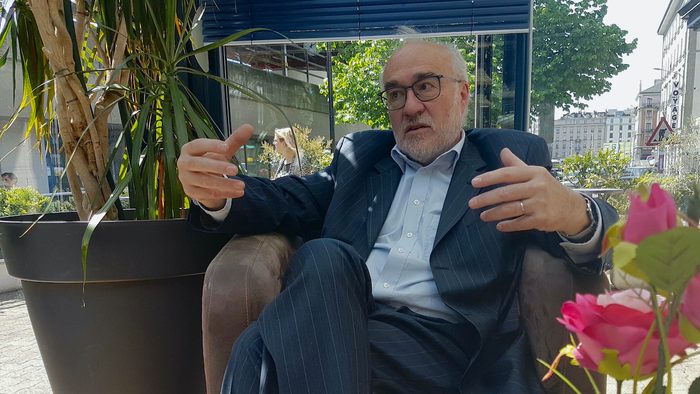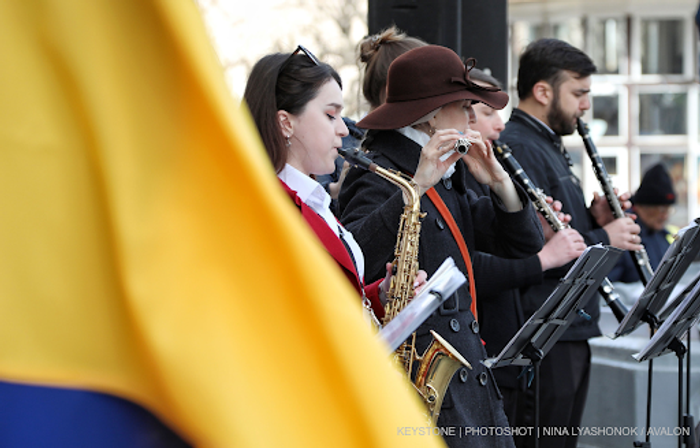Good morning, this is Michelle and today the WMO’s former boss has some ideas on how international Geneva can step up its game, namely host a climate summit. The idea is already in discussions in Bern so it may not be too far fetched as a suggestion.
On news from UN Geneva, we’re covering North Korea’s Covid outbreak and Mexico’s disappeared people surpassing the 100,000 mark.
Plus, don't miss our event on Friday evening on human rights in Guatemala, where we'll hear from a local land rights activist and a Swiss volunteer using her presence in the country to discourage attacks against defenders. |

|

Michel Jarraud, WMO secretary general emeritus. (Credit: Geneva Solutions/ML)
|
|
Bring Cop to Geneva.
Scorching heat waves, crop-ravaging floods, and menacing sea level rise have propelled climate change to the top of the global agenda. Geneva’s colliding worlds of diplomacy, academics, activism, and technical expertise have helped drive the debate, often from behind the scenes. It should take things further, according to the World Meteorological Organisation’s former leader Michel Jarraud. In a report to be published today, the French meteorologist recommends that Geneva hosts a climate Cop in the near future. Geneva Solutions
Geneva Solutions (EN)
|
|
Here's what else is happening
|

Musicians of the wind orchestra perform during the “Javelina” humour show in support of the Armed Forces of Ukraine at the railway station on 1 April, 2022, in Odesa, Ukraine. (Credit: Keystone/Nina Lyashonok/Avalon)
|
|
|
Human rights in Guatemala.
As part of a speaking tour organised by Peace Brigades International Switzerland, we invite you to discover the film “Nuestras Madres” (Caméra d'Or - Festival de Cannes 2019), which immerses us in post-civil war Guatemala. The movie will be followed by a discussion with a Guatemalan human rights defender and a Swiss volunteer with PBI Guatemala, moderated by our journalist Michelle Langrand.
Peace Brigades International (FR)
|
|
|
Science and diplomacy reads by GESDA
|
|

Image of a robot-dog being developed by ETH Zurich and the University of Zurich to explore the moon. (Credit: UNIZH)
|
|
The Moon is the goal.
And not only for photographers, who made some wonderful shots on Sunday of the last lunar eclipse, showing a rare super blood Moon. At least six countries – the US, Japan, South Korea, Russia, India, and the United Arab Emirates – are about to launch a mission to Earth’s natural satellite, the most famous being maybe the $93bn Artemis, by Nasa.
“Science isn’t the only driving force,” explains an in-depth article in Nature (read below). “The flurry of missions also signals the growing ambition of several nations and commercial players to show off their technological prowess and leave their mark, particularly now that getting to the Moon is easier and cheaper than ever before.” A minor goal is also to have a more precise view of the resources that exist up there.
That is where Switzerland, which on 17 May signed an agreement with the European Space Agency to host a space deep-tech innovation centre, comes in, with… a dog. Not a Saint Bernard, but a robot-dog, developed by the ETH Zurich and the University of Zurich, which will have the task – if it ever flies to the Moon – of exploring its southern polar region and prospect for minerals, equipped as it is of the best instruments to do so.
This unconventional robot might then also be used to find the best regolith (lunar sand) to grow plants: a team of scientists has just cultivated the fast-growing plant Arabidopsis thaliana in three kinds samples of regolith brought back to Earth, and showed that the biological species grew better in the soil that was the least exposed (to the Sun, the falling of small meteorites, etc…), that is in the regions protected inside the Moon craters. That might give a good indication on where to tentatively grow edible plants.
There is no reason why future Moon settlers wouldn’t have to eat their greens.
Olivier Dessibourg, GESDA
|

This selection is proposed by the Geneva Science and Diplomacy Anticipator
GESDA, working on
anticipating cutting-edge science and technological advances to develop innovative and inclusive
solutions for the
benefit of the planet and its inhabitants.
|
|
GS news is a new media project covering the world of international cooperation and development. Don’t hesitate to forward our newsletter!
Have a good day!
|

|
|
Avenue du Bouchet 2
1209 Genève
Suisse
|
|
|
| |












